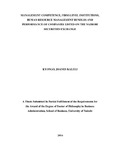Management Competence, Firm-level Institutions, Human Resource Management Bundles and Performance of Companies Listed on the Nairobi Securities Exchange
Abstract
Today’s dynamic business environment requires publicly quoted companies to enhance their performance so as to remain competitive. This calls for careful consideration of the factors that influence their performance. The extant study sought to find out the effects of management competence, firm-level institutions, and human resource management (HRM) bundles on the performance of companies listed on the Nairobi Securities Exchange (NSE). The specific objectives of the study were to determine: the effect of management competence on the performance of companies listed on the Nairobi Securities Exchange, the effect of firm- level institutions on the relationship between management competence and performance of companies listed on the Nairobi Securities Exchange, the effect of HRM bundles on the relationship between management competence and performance of companies listed on the NSE and whether the combined effect of management competence, firm-level institutions and HRM bundles on company performance was different from the individual effect of management competence. Four hypotheses corresponding to the specific objectives of the study were formulated and tested. The study was informed by Knowledge Space Theory, Resource- Based View (RBV) and Ability-Motivation-Opportunity (AMO) Theory. The study targeted HR. managers of each of the 64 companies listed on the Nairobi Securities Exchange as at December 2014 and 34 of them responded. The study adopted the Positivist research philosophy and a descriptive survey design. SPSS Version 21 was applied to analyze data using descriptive statistics and inferential statistics (Regression Analysis). Statistical tests of hypotheses conducted included normality and linearity tests, multicollinearity test and Levine test. Research findings from the tests of hypotheses established that management competence positively and significantly affected company performance, firm-level institutions and HRM bundles moderate the relationship between management competence and company performance, and the combined effect of management competence, firm-level institutions and HRM bundles on company performance was different from the individual effect of management competence. The study findings support the RBV Theory, Knowledge Space Theory and AMO Theory, which underscore the crucial role of management competence, firm-level institutions and HRM bundles in company performance. The study has contributed to the existing body of knowledge by establishing that firm-level institutions and HRM bundles moderate the relationship between management competence and company performance and that management competence, firm-level institutions and HRM bundles combined explain company performance . One of the limitations of the study was that it used cross- sectional data and targeted only those companies listed on the NSE, making it hard to generalize the study findings to other organizations. Finally, the study recommends further investigation of the study variables in Non-governmental organizations, small and medium enterprises and faith-based organizations, using longitudinal data and a different data analysis technique to test whether the outcome will be different.
Publisher
University of Nairobi
Rights
Attribution-NonCommercial-NoDerivs 3.0 United StatesUsage Rights
http://creativecommons.org/licenses/by-nc-nd/3.0/us/Collections
The following license files are associated with this item:


